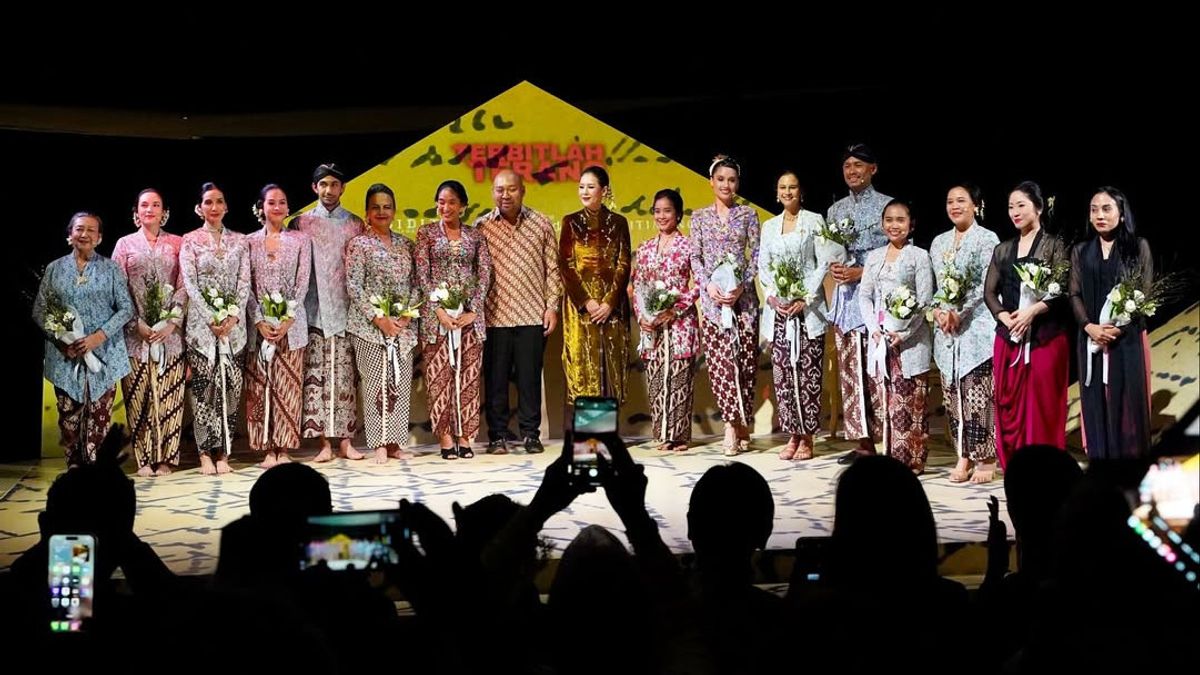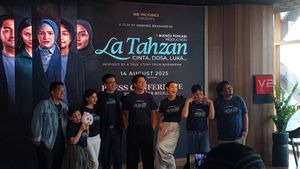JAKARTA - Titimangsa together with the Djarum Foundation Cultural Service invites intergenerational artists to unite in a literary and voice performance to welcome Kartini Day. This show titled Terbitlah Terangkap: Surat Reading and Kartini Ideas.
Held at the National Museum of Indonesia, Jakarta on April 21, this performance is a tribute to the thoughts, struggles and souls of a Raden Ajeng Kartini, a figure who is still a fire for women and the Indonesian nation.
Terbitlah Terangkap: The reading of Kartini's Letter and Ideas is not just a reminder of the figure of Raden Ajeng Kartini as a hero of emancipation, but also as a visionary woman who lays the foundation of self-awareness, equality, and courage to think. Through his honest and inspiring letters, Kartini shows that big changes always start from the courage to feel, reflect, and voice the truth that is believed.
This is an important moment for the younger generation to reflect on the meaning of struggle and continue Kartini's spirit today. With education, courage, and empathy, we can create a world that is fairer, equal and humane. Because Kartini's spirit is not just belonging to the past, it is a light that guides our steps today and in the future," said Renitasari Adrian, Djarum Foundation's Culture Bakti Director Program.
Packed with monologue reading, Kartini's original papers were revived through the voices of well-known Indonesian artists: Christine Hakim, Ratna Riantiarno, Reza Rahadian, Marsha Timothy, Maudy Ayunda, Lutesha, Cinta Laura, Chelsea Islan, Happy Salma, and Bagus Ade Putra. With the direction of Sri Qadariatin as director, these multigeneration artists not only read, but brought Kartini's heart to life which was written more than a century ago, but still felt so relevant today.
SEE ALSO:
"Today, we not only remember Kartini as a historical figure, but celebrate it as a reflection for every human woman and man who continues to struggle to understand her thoughts, absorb their feelings, and express them honestly. Being a human means being independent in thinking and intact in feeling. Reading Kartini's letters is not just a history study, but steps into the inner space of a woman who dares to dream and think beyond the boundaries of her time. Celebrating Kartini is celebrating the courage to get to know herself and voice her conscience. Kartini has proven that a woman's voice, when honest in her mind and loyal to her heart, has the power to change the course of history, "said Happy Salma, Founder of Titimangsa in his written statement.
These read letters were taken from Pramoedya Ananta Toer's Call Book Only by Pramoedya Ananta Toer, published by Lentera Dipantara 2006 and Kartini's book: Collection of Letters 1899-1904 by Wardinam Djoyonegoro, Volume 1, published by Obor's 2024 library. Kartini wrote her first letter to one of her pen friends, Estelle (Stella) Zeehandelaar, a feminism activist in the Netherlands. The letter became the starting point of a series of correspondences that became widely known as a form of the early thought of Indonesian women about emancipation, education, and social justice.
Through these papers, Kartini not only shows her intelligence and social sensitivity, but also the courage to sue the unequal social structure and silence women's voices. Letters to Stella are a reflection of cross-cultural gatherings that live to solidarity, as well as the unstoppable spirit of the times.
Kartini's anxiety and balance were also conveyed honestly and in depth through her correspondence with Mr. and Mrs. Abendanon, the couple who became a big supporter of Kartini's struggle. Through these letters, Kartini expressed her longing for freedom, her desire to learn, and her hopes for the future of women in her homeland.
Call me Kartini...
The sentence became the main life of this show, opening a space for reflection of the contents of the letter full of courage, sadness, love, anger, and hope. The reading was carried out with a diverse approach to revive Raden Ajeng Kartini's heart and mind through his eternal letters. Opened with the Ratna Riantiarno's prologue to deliver a performance of Kartini's papers and his ideas by involving historically drafting Kartini's letters.
Then continued with the role actions of Christine Hakim and Marsha Timothy, voicing Kartini's ideas about the importance of awareness of the advancement of education. Chelsea Islan, Cinta Laura, Luthesa, and Bagus Ade Saputra, raised Kartini's thoughts on norms and social values formed by gender bias, as well as fragments about women's freedom and self-esteem. Meanwhile, Reza Rahadian and Maudy Ayunda presented Kartini's criticism of government policies that had an impact on the people's economy and environmental issues. Then the Epilog of the performance was Published Bright closed by Happy Salma's narrative so reflectively and contemporaryly.
Through this performance, Kartini is not just a historical figure, she comes as a relevant and lit voice to answer the challenges of today.
This performance is not just a form of respect for RA Kartini as a female emancipatory figure, but also as a reflective space for the public to trace women's thoughts and courage in overcoming the social and cultural boundaries of her time. Through the reading of Kartini's letters, the audience is invited to dive into the personal dimension of a visionary woman, who writes not only as a form of self-expression, but also as an effort to build collective awareness. Kartini not only leaves the narrative legacy, but also the passion to think independently, feel intact, and speak honestly, "said Sri Qadariatin, Director of this performance.
Performance Terbitlah Terang: The Reading of Kartini's Letters and Ideas is also part of the opening of the SUNTING exhibition: Traces of Indonesian Women Movement Change. The SUNTING Exhibition is a tribute to the role of Indonesian women in history, with fun as a symbol of strength, dignity, and social change.
From the issuance of Malays by Rohana Kudus to the struggle of RA Kartini, women have actively voiced equality and formed the direction of the nation through various fields. This exhibition invites reflection on the contribution of women in building civilization and encourages our participation in the struggle towards a more equal future. This exhibition will take place on April 22 - July 31 at the National Museum of Indonesia.
The English, Chinese, Japanese, Arabic, and French versions are automatically generated by the AI. So there may still be inaccuracies in translating, please always see Indonesian as our main language. (system supported by DigitalSiber.id)











